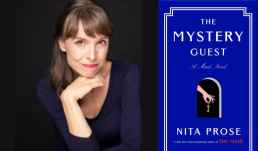- Categories:
A Q&A with Nita Prose, Author of December Indie Next List Top Pick “The Mystery Guest”
- By Zoe Perzo
Independent booksellers across the country have chosen Nita Prose’s The Mystery Guest (Ballantine Books) as their top pick for the December 2023 Indie Next List.

Molly the maid returns in The Mystery Guest to solve another mysterious death in the Regency Grand Hotel.
“Molly is back with another entertaining mystery to solve at the Regency Grand Hotel. This time, a famous author is under scrutiny, featuring a pack of rabid fans and a peek into Molly’s past,” said Jenny Stroyeck of The Homer Bookstore in Homer, Alaska.
Here, Prose discusses her work with Bookselling This Week.
Bookselling This Week: The murder of a murder mystery author is always an exciting story choice! How did the idea for Molly’s second adventure occur to you?
Nita Prose: I got the idea for The Mystery Guest while on tour in the UK for The Maid. While visiting a castle museum in Sussex, England, I noticed the most unusual pair of items in a display case — a mummified rat and an old silver spoon. The display was a memorial to a young servant girl who’d worked in the castle and who’d been accused of stealing a silver spoon from her employers. Despite protesting her innocence, she was fired. Years later, when builders renovated the fortress, they came across a rat’s nest containing a mummified rat…and the missing silver spoon.
What I love about this true-to-life story is how it’s a parable and a cautionary tale rolled into one:
Be careful what you assume.
Nothing is as it seems.
The truth won’t stay buried forever.
That little kernel of truth lodged in my subconscious mind. I began thinking more deeply about preconceptions and hasty judgments (we’re all guilty of them), about the invisible workers in our midst (past and present), and most important of all, how the voices of the departed don’t always ebb after death but sometimes grow stronger — absence becoming presence, the greatest mystery of all. All of this became the thematic backdrop of The Mystery Guest.
BTW: Much of this story is told in flashbacks to Molly’s childhood, and we seamlessly slip between her memories and the present. Was it difficult for you to weave all this new information into what we already knew about Molly’s childhood? Or was it easy for you to see how everything fit together?
NP: The Mystery Guest was difficult to write, as all writing is. In some ways, working with two time periods is almost like writing two books at the same time, but I loved the idea of a mystery where the past solves the present. Interweaving Molly’s childhood with her adulthood kept me creatively challenged and provided some new terrain to explore.
BTW: What’s next for you? Are we going to see more of Molly the maid?
NP: I never set out to write a series, and yet, here I am, with The Mystery Guest being the second Molly the Maid book. Will there be another? Never say never! If my readers want more, I will listen to that very carefully, but I’ll only deliver more if I feel I won’t deliver less, if that makes sense. Molly and Gran’s lives are the greatest mystery of all for me, greater than any high jinks that occur at the Regency Grand, and perhaps there’s more room to explore that in future books…but I leave that up to my readers.
BTW: What are you reading right now?
NP: I often get early copies of books, and something I read recently and greatly enjoyed is A. J. Finn’s upcoming novel End Of Story (publishing in 2024). What a tremendous stylist he is, never a sentence or gesture wasted — and I think anyone who likes The Woman In The Window will enjoy his next as well.
BTW: We know you work in publishing, so you rather live and breathe books. But would you tell us a little more about the role of books and indie bookstores in your life?
NP: It’s true. I live and breathe books. And I am grateful to all booksellers who devote their professional lives to the mad pursuit of connecting books to readers. Independent bookstores are often so much more than just retail spaces. They’re places where communities can gather, exchange ideas, and grow a shared sense of belonging. There’s nothing quite like walking into an indie and having your local bookseller call you by your name, pick up a book and say, “Have you read this yet? I think you’ll like it.” Inevitably, because those [book]sellers know their customers so well, they pick a book you fall in love with. That’s the magic of a community bookstore — the people who work there care about you personally and they foster a love of literature and reading.

